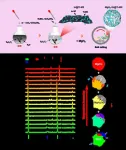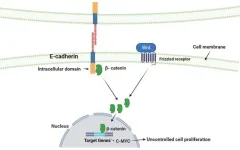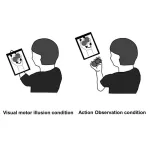(Press-News.org) December 21 Peer reviewed /observational study / in people*
Strictly embargoed 4PM UK time on Tuesday December 26
Researchers have identified a wide range of risk factors for young-onset dementia. The findings challenge the notion that genetics are the sole cause of the condition, laying the groundwork for new prevention strategies.
The largescale study identified 15 risk factors, which are similar to those for late-onset dementia. For the first time, they indicate that it may be possible to reduce the risk of young-onset dementia by targeting health and lifestyle factors.
Relatively little research has been done on young-onset dementia, though globally there are around 370,000 new cases of young-onset dementia each year.
Published in JAMA Neurology, the new research by the University of Exeter and Maastricht University followed more than 350,000 participants younger than 65 across the United Kingdom from the UK Biobank study. The team evaluated a broad array of risk factors ranging from genetic predispositions to lifestyle and environmental influences. The study revealed that lower formal education, lower socioeconomic status, genetic variation, lifestyle factors such as alcohol use disorder and social isolation, and health issues including vitamin D deficiency, depression, stroke, hearing impairment and heart disease significantly elevate risk of young-onset dementia
Professor David Llewellyn of the University of Exeter emphasized the importance of the findings: "This breakthrough study illustrates the crucial role of international collaboration and big data in advancing our understanding of dementia. There's still much to learn in our ongoing mission to prevent, identify, and treat dementia in all its forms in a more targeted way. This is the largest and most robust study of its kind ever conducted. Excitingly, for the first time it reveals that we may be able to take action to reduce risk of this debilitating condition, through targeting a range of different factors.
Dr Stevie Hendriks, Researcher at Maastricht University, said: “Young-onset dementia has a very serious impact, because the people affected usually still have a job, children, and a busy life. The cause is often assumed to be genetic, but for many people we don’t actually know exactly what the cause is. This is why we also wanted to investigate other risk factors in this study.”
Sebastian Köhler, Professor of Neuroepidemiology at Maastricht University, said: “We already knew from research on people who develop dementia at older age that there are a series of modifiable risk factors. In addition to physical factors, mental health also plays an important role, including avoiding chronic stress, loneliness and depression. The fact that this is also evident in young-onset dementia came as a surprise to me, and it may offer opportunities to reduce risk in this group too.”
The study's support was supported by Alzheimer’s Research UK, The Alan Turing Institute/Engineering and Physical Sciences Research Council, Alzheimer Nederland, Gieskes Strijbis Fonds, the Medical Research Council, the National Institute for Health and Care Research (NIHR) Applied Research Collaboration South West Peninsula (PenARC), the National Health and Medical Research Council, the National Institute on Aging, and Alzheimer Netherlands.
Dr Janice Ranson, Senior Research Fellow at the University of Exeter, said: “Our research breaks new ground in identifying that the risk of young-onset dementia can be reduced. We think this could herald a new era in interventions to reduce new cases of this condition.”
Dr Leah Mursaleen, Head of Clinical Research at Alzheimer’s Research UK, which co-funded the study, said: “We’re witnessing a transformation in understanding of dementia risk and, potentially, how to reduce it on both an individual and societal level. In recent years, there’s been a growing consensus that dementia is linked to 12 specific modifiable risk factors such as smoking, blood pressure and hearing loss . It’s now accepted that up to four in 10 dementia cases worldwide are linked to these factors.
“This pioneering study shines important and much-needed light on factors that can influence the risk of young-onset dementia. This starts to fill in an important gap in our knowledge. It will be important to build on these findings in broader studies.’
The full study is entitled ‘Risk factors for young-onset dementia in the UK Biobank: A prospective population-based study’, published in JAMA Neurology.
ENDS
END
Risk of young-onset dementia could be reduced through targeting health and lifestyle factors - study
Researchers have identified a wide range of risk factors for young-onset dementia. The findings challenge the notion that genetics are the sole cause of the condition, laying the groundwork for new prevention strategies.
2023-12-26
ELSE PRESS RELEASES FROM THIS DATE:
In situ characterization reveals different dehydrogenation pathways in MgH2
2023-12-26
They published their work on Dec. 20 in Energy Material Advances.
"Economic, efficient, and safe hydrogen storage methods play a crucial role in exploiting hydrogen energy, reducing carbon emissions, and improving the utilization efficiency of renewable clean energies," said paper author Jianxin Zou, professor in National Engineering Research Center of Light Alloys Net Forming & State Key Laboratory of Metal Matrix Composites. "Solid-state hydrogen storage in hydrides has been considered as a promising hydrogen storage technology. Although the industrial ...
Artificial intelligence predicts the influence of microplastics on soil properties
2023-12-26
Plastic waste and its buildup in nature has become a major environmental concern in recent times. While plastic pollution in the oceans is undoubtedly a concern, the presence of plastics in soils around the world is also known to cause severe environmental and health issues. As plastics fragment into smaller pieces known as microplastics (MPs) in the soil through natural and anthropogenic processes, they drastically alter soil properties. Moreover, they are also absorbed by plants, potentially entering human ...
ACP says barriers to participating in the electoral process must be removed
2023-12-25
Embargoed for release until 5:00 p.m. ET on Monday 25 December 2023
Annals of Internal Medicine Tip Sheet
@Annalsofim
Below please find summaries of new articles that will be published in the next issue of Annals of Internal Medicine. The summaries are not intended to substitute for the full articles as a source of information. This information is under strict embargo and by taking it into possession, media representatives are committing to the terms of the embargo not only on their own behalf, but also on behalf of the organization they represent.
----------------------------
1. ...
Electronic “soil” enhances crop growth
2023-12-25
Barley seedlings grow on average 50% more when their root system is stimulated electrically through a new cultivation substrate. In a study published in the journal PNAS, researchers from Linköping University have developed an electrically conductive “soil” for soilless cultivation, known as hydroponics.
“The world population is increasing, and we also have climate change. So it’s clear that we won’t be able to cover the food demands of the planet with only the already existing agricultural methods. But with hydroponics we can grow food also in ...
Unraveling the mystery of hereditary diffuse gastric cancer
2023-12-25
Gastric cancer, a significant global health burden, claims over 7% of cancer-related deaths annually. Although only 1-3% of cases have a genetic basis, understanding these genetic drivers is crucial for developing preventative strategies.
Gastric cancer, a formidable foe in the global health arena, casts a long shadow over millions of lives each year. While its tendrils reach far and wide, a distinct subset – hereditary diffuse gastric cancer (HDGC) – emerges as a particularly aggressive and enigmatic adversary. This group of cancers, accounting for roughly 10% ...
Power of illusion can help with learning new movements
2023-12-23
Tokyo, Japan – Researchers from Tokyo Metropolitan University showed that visual aids which create the illusion of movement, like a screen placed in front of one’s hand showing the hand move, can improve motor performance and the early stages of motor learning. Compared to observing third-person motions, functional near-infrared spectroscopy data also showed greater changes in brain activity in regions associated with motor learning. Findings like this might inform new treatment strategies for hemiplegic stroke patients.
Visual-motor illusion (VMI) is the curious illusion of watching your body move even while it is still. ...
Live Christmas trees affect indoor air chemistry, NIST researchers find
2023-12-22
Every holiday season, Americans buy nearly 30 million live Christmas trees. Many families enjoy not only having a live tree inside their homes but also smelling the fresh fragrance it creates. That smell comes from chemicals called volatile organic compounds (VOCs). However, little is known about how much is emitted and whether they have any health impacts.
“Our nose is a good chemical sensor,” said Dustin Poppendieck, an environmental engineer at the National Institute of Standards and Technology (NIST). “We know that these trees are emitting something, ...
Evolution of tuberculosis – in new light
2023-12-22
Recent research suggests that the emergence of tuberculosis infection in human populations dates back tens of thousands of years earlier than previously known cases in the Middle East. In collaboration with an international research team, Hungarian researchers have edited and published a special issue of the journal Tuberculosis.
In July 2022, the Department of Anthropology of the University of Szeged organised a conference on the paleopathology and evolution of tuberculosis. The ICEPT3 conference was closely linked to the NRDI-best funded research project of György ...
Study reveals the relationship of gut microbiome on children’s brain development and function
2023-12-22
WELLESLEY, MA – Emerging evidence implicates the gut microbiome in cognitive outcomes and neurodevelopmental disorders, but the influence of gut microbial metabolism on typical neurodevelopment has not been explored in detail.
Researchers from Wellesley College, in collaboration with other institutions, have demonstrated that differences in the gut microbiome are associated with overall cognitive function and brain structure in healthy children. This study – published today in Science Advances – is a part of the Environmental Influences ...
Major breakthrough in hypertension diagnosis could save Government billions
2023-12-22
HMRI and University of Newcastle researcher, Professor Murray Cairns, along with his Precision Medicine team have discovered a way of predicting who will respond to blood pressure treatments to lower sodium in the body. Their findings were published this week in Circulation, a prestigious international cardiology journal.
Professor Cairns says, “High blood pressure – or hypertension related disease – kills up to 20 per cent of people. At least 30 per cent of the adult population has it – that’s ...
LAST 30 PRESS RELEASES:
Increasing the number of coronary interventions in patients with acute myocardial infarction does not appear to reduce death rates
Tackling uplift resistance in tall infrastructures sustainably
Novel wireless origami-inspired smart cushioning device for safer logistics
Hidden genetic mismatch, which triples the risk of a life-threatening immune attack after cord blood transplantation
Physical function is a crucial predictor of survival after heart failure
Striking genomic architecture discovered in embryonic reproductive cells before they start developing into sperm and eggs
Screening improves early detection of colorectal cancer
New data on spontaneous coronary artery dissection (SCAD) – a common cause of heart attacks in younger women
How root growth is stimulated by nitrate: Researchers decipher signalling chain
Scientists reveal our best- and worst-case scenarios for a warming Antarctica
Cleaner fish show intelligence typical of mammals
AABNet and partners launch landmark guide on the conservation of African livestock genetic resources and sustainable breeding strategies
Produce hydrogen and oxygen simultaneously from a single atom! Achieve carbon neutrality with an 'All-in-one' single-atom water electrolysis catalyst
Sleep loss linked to higher atrial fibrillation risk in working-age adults
Visible light-driven deracemization of α-aryl ketones synergistically catalyzed by thiophenols and chiral phosphoric acid
Most AI bots lack basic safety disclosures, study finds
How competitive gaming on discord fosters social connections
CU Anschutz School of Medicine receives best ranking in NIH funding in 20 years
Mayo Clinic opens patient information office in Cayman Islands
Phonon lasers unlock ultrabroadband acoustic frequency combs
Babies with an increased likelihood of autism may struggle to settle into deep, restorative sleep, according to a new study from the University of East Anglia.
National Reactor Innovation Center opens Molten Salt Thermophysical Examination Capability at INL
International Progressive MS Alliance awards €6.9 million to three studies researching therapies to address common symptoms of progressive MS
Can your soil’s color predict its health?
Biochar nanomaterials could transform medicine, energy, and climate solutions
Turning waste into power: scientists convert discarded phone batteries and industrial lignin into high-performance sodium battery materials
PhD student maps mysterious upper atmosphere of Uranus for the first time
Idaho National Laboratory to accelerate nuclear energy deployment with NVIDIA AI through the Genesis Mission
Blood test could help guide treatment decisions in germ cell tumors
New ‘scimitar-crested’ Spinosaurus species discovered in the central Sahara
[Press-News.org] Risk of young-onset dementia could be reduced through targeting health and lifestyle factors - studyResearchers have identified a wide range of risk factors for young-onset dementia. The findings challenge the notion that genetics are the sole cause of the condition, laying the groundwork for new prevention strategies.






